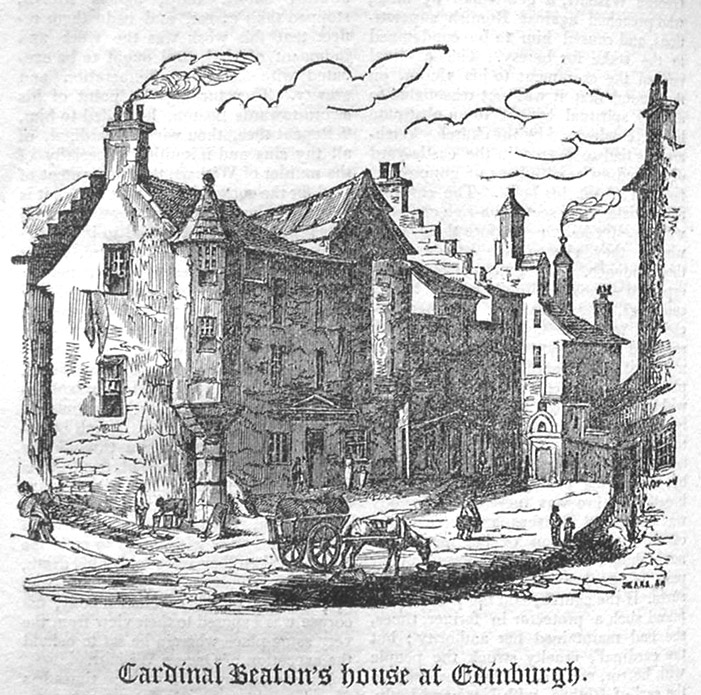
| Every-Day Book | vol II date / index |
May 28.
St. Germanus, Bp. of Paris, A.D. 576. St. Caraunus, also Caranus and Caro, (in French, Cheron.)
CHRONOLOGY .
1546. Cardinal Beaton was on this day assassinated in Scotland. He was primaet [sic] of that kingdom, over which he exercised almost sovereign sway. Just before his death he got into his power George Wishart, a gentleman by birth, who preached against Romish superstitions, and caused him to be condemned to the stake for heresy. The cardinal refused the sacrament to his victim, on the ground that it was not reasonable to allow a spiritual benefit to an obstinate heretic, condemned by the church. Wishart was tied to a tree in the castle-yard of St. Andrew's, with bags of gunpowder fastened about his body. The cardinal and prelates were seated on rich cushions with tapestry hangings before them, from whence they viewed the execution of their sentence. The gunpowder having exploded without ending Wishart's bodily sufferings, the inflexible reformer exclaimed from the fire, "This flame hath scorched my body, yet hath it not daunted my spirit: but he who from yonder high place beholdeth me with such pride, shall within a few days lie in the same as ignominiously as now he is seen proudly to rest himself." After these words, the cord that went about his neck was drawn by one of the executioners to stop his breath, the fire was increased, his body was consumed to ashes, and the cardinal caused proclamation to be made that none should pray for the heretic under pain of the heaviest ecclesiastical censures. If the church, said the priests, had found such a protector in former times, she had maintained her authority; but the cardinal's cruelty struck the people with horror, and John Lesly, brother to the earl of Rothes, with Normand Lesly, the earl of Rothes' son, (who was disgusted on account of some private quarrel,) and other persons of birth and quality, openly vowed to avenge Wishart's death. Early in the morning they entered the cardinal's palace at St. Andrews, which he had strongly fortified; though they were not above sixteen persons, they thrust out a hundred tradesmen and fifty servants, whom they seized separately, before any suspicion arose of their intentions; and having shut the gates, they proceeded very deliberately to execute their purpose on the cardinal. Beaton alarmed with the noise which he heard in the castle, barricadoed the door of his chamber: but finding that they had brought fire in order to force their way, and having obtained, as is believed, a promise of life, he opened the door; and reminding them that he was a priest, he conjured them to spare him. Two of them rushed upon him with drawn swords, but a third, James Melvil, stopped their career, and bade them reflect that this work was the work and judgment of God, and ought to be executed with becoming deliberation and gravity. Then turning the point of his sword towards Beaton, he called to him, "Repent thee, thou wicked cardinal, of all thy sins and iniquities, especially of the murder of Wishart, that instrument of God for the conversion of these lands: it is his death which now cries vengeance upon thee: we are sent by God to inflict the deserved punishment. For here, before the Almighty, I protest, that it is neither hatred of thy person, nor love of thy riches, nor fear of thy power, which moves me to seek thy death: but only because thou hast been, and still remainest, and obstinate enemy to Christ Jesus, and his holy gospel." Having spoken these words, without giving Beaton time to finish that repentance to which he exhorted him, he thrust him through the body, and the cardinal fell dead at his feet. Upon a rumour that the castle was taken, a great tumult arose in the city; and several partisans of the cardinal armed themselves with intent to scale the walls. When they were told of his death, they desisted, and the people insisting upon a sight of the cardinal's body, his corpse was exposed to their view from the very same place wherein he sat to behold the execution of George Wishart.
The sanguinary spirit of these times has disappeared, and we look upon what remains to us of the individuals who suffered, or acted under its influence, as memorials of such crimes and ciminals as we in a milder age dare not imagine our country can be again afflicted with. The sight of cardinal Beaton's house in the Cowgate, at Edinburgh, may have induced useful reflections on past intolerance, and increased charitable dispositions in some whose persuasions widely differ. If this be so, a representation of it in this sheet may not be less agreeable to the moralist than to the lover of antiquities. The drawing from whence the engraving on the next page is taken, was made on the spot in 1824.
FLORAL DIRECTORY.
Lurid Fleur-de-lis. Irid Lurida.
Dedicated to St. Germain.